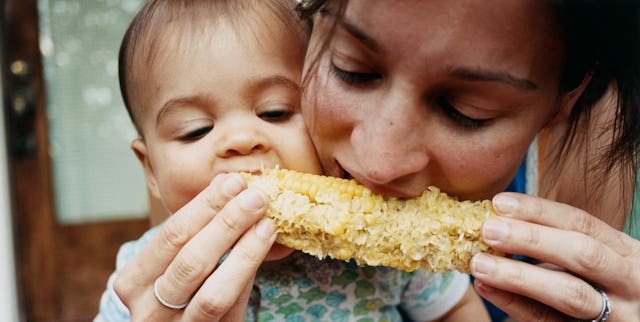Even Babies Get That Sharing Food Shows Intimacy

File under gross but true: kids observe spit-swapping to learn about the people around them, study finds
How do babies and kids know whether two people are part of a family unit or total strangers? How do they know who will help them when they need it? A new study has found that even small babies collect information about the relationships around them by observing who is sharing saliva — whether it’s kissing, sharing food, or wiping a smudgy face with some spit.
Totally gross, but it makes sense.
Specifically, the study, which was published in Science last week, found that children, toddlers, and infants all pick up on saliva-sharing cues in order to determine caregiving relationships.
“What this work shows is that infants from very early on are figuring out not only who is connected, but how they’re connected,” says Ashley Thomas, the study’s lead author and a psychologist at the Massachusetts Institute of Technology (MIT).
The study took kids in three different age groups (infants, toddlers, and little kids) and showed them two scenarios on video. In the first scenario, a woman talks with a puppet, takes a bite of an orange slice, and then shares it with the puppet. In the second scenario, the woman talks to the puppet and hands it a ball. After it’s handed the object, the puppet begins crying.
Researchers observed the kids watching these videos — and through timing how long the infant looked at the woman when the puppet was crying, found that the kids expected the woman to help the crying kid more if they had first shared the orange slice (and therefore shared saliva). They didn’t necessarily expect the woman to help the crying puppet if she had only handed it the ball.
Christine Fawcett, a psychologist at Uppsala University in Sweden who wrote about the study in an accompanying article in Science, believes that this special recognition is likely an inborn mechanism since such young children can recognize its importance. But more research needs to be done to confirm her hunch.
The study has a few shortfalls — it only involved a few hundred kids, and it also didn’t involve kids from different cultures around the world. This makes it tough to tell if children taking cues from saliva-sharing is universal or innate.
Those working on the study also want to make clear that children can have extremely meaningful relationships with caregivers who don’t salvia-share with them — people like pre-school teachers, daycare workers, and others. And saliva-sharing doesn’t have to happen in order for kids to bond with caregivers, or in order for caregivers to be effective.
“We don’t expect daycare teachers to have the enduring attachments that you might find in a thick relationship,” Thomas says. “That doesn’t mean that they’re not doing a good job taking care of the children. Daycare teachers provide an absolutely essential service to society, and we should pay them more.”
But for now, just know that every time you kiss your partner or share a fork with your toddler, your kids are watching and learning about familial closeness.
This article was originally published on